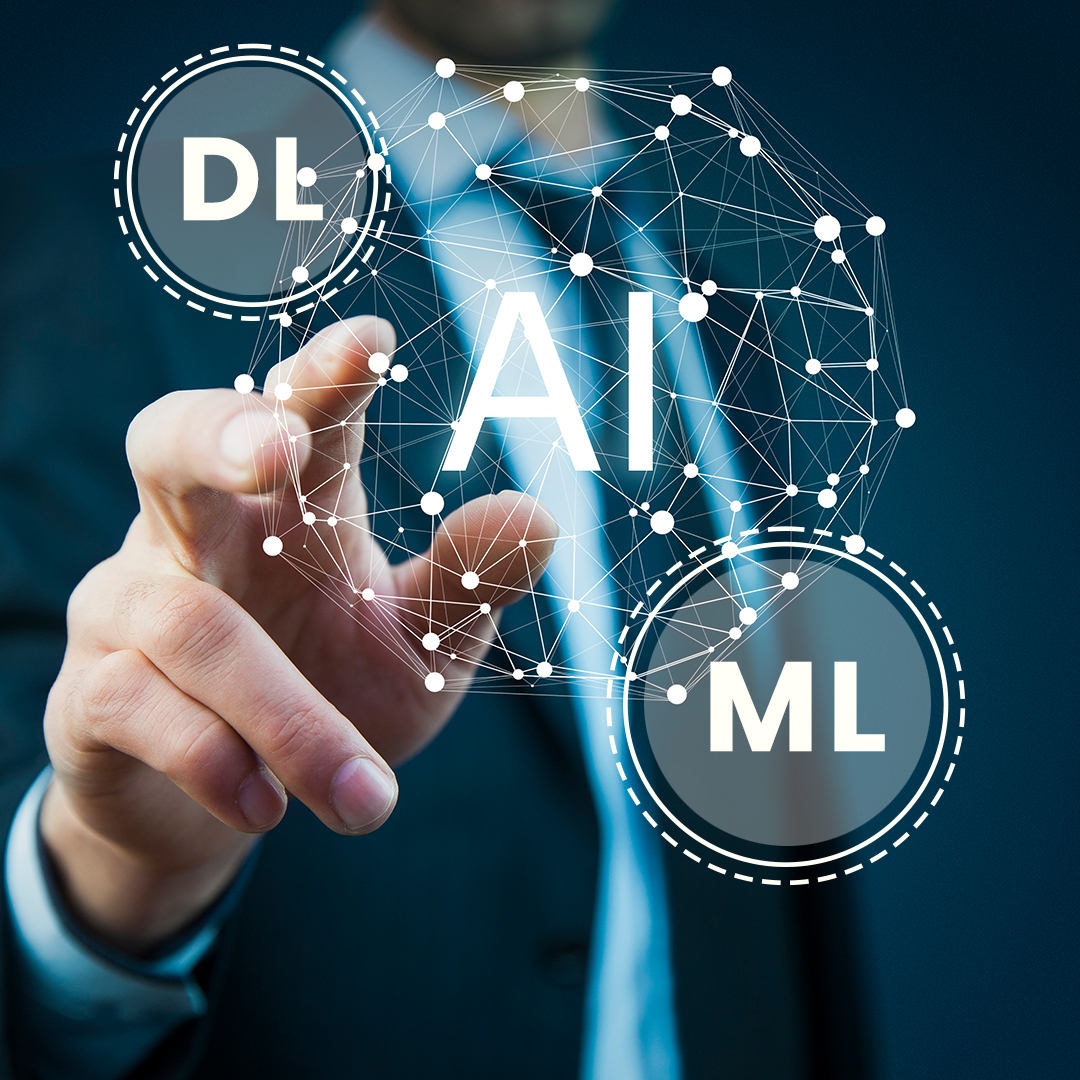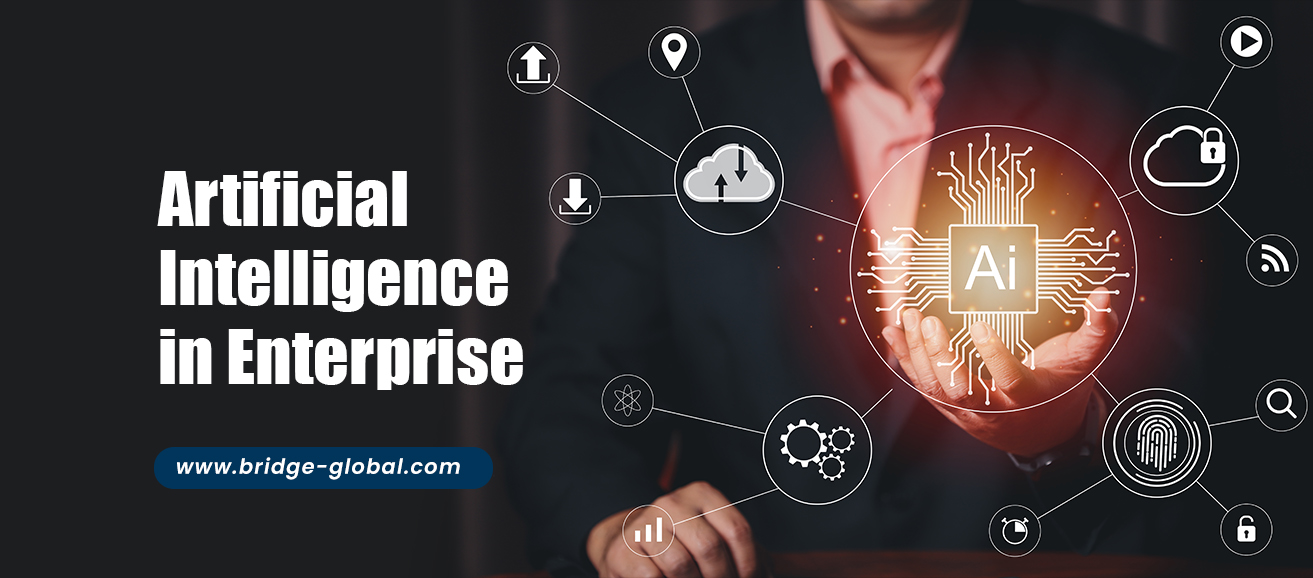AI in Enterprise: An Enlightening Overview
The impact and significance of Artificial intelligence in Enterprise (AI in enterprise) are profound, transforming the way organizations operate and compete in the digital age. According to the Global State of AI, 2023 report by research firm Frost & Sullivan, a significant majority of surveyed organizations, 87%, expressed confidence in the potential of AI and machine learning to enhance their revenue growth and operational efficiency.
A Quick Grasp of AI and Related Terms
If you are planning to collaborate with a company that offers AI solutions and Artificial intelligence development services to help you excel in your business domain, it is better to get a grasp of different AI-related concepts.
AI is the overarching field that encompasses both machine learning and deep learning. Machine learning is a subset of AI that focuses on developing algorithms to make predictions based on data, while deep learning is a subset of machine learning that employs deep neural networks to automatically learn and represent complex patterns in data.

AI (Artificial Intelligence): Artificial Intelligence, or AI technology, is a broad field of computer science that aims to create systems or machines capable of performing tasks that typically require human intelligence. These tasks include problem-solving, pattern recognition, decision-making, speech recognition, and more. AI encompasses various subfields and techniques, including machine learning and deep learning, to achieve its goals. AI is a foundational concept, and both machine learning (ML) and deep learning (DL) are subsets of AI.
Machine Learning (ML): Machine Learning is a subset of AI that focuses on developing algorithms and models that enable computers to learn from and make predictions or decisions based on data. Unlike traditional programming, where explicit instructions are provided, ML systems improve their performance over time by analyzing and adapting to patterns within the data. ML algorithms include techniques like linear regression, decision trees, support vector machines, and neural networks. It's a crucial component of AI, often used for tasks such as data analysis, recommendation systems, and predictive analytics.
Deep Learning (DL): Deep Learning is a subfield of machine learning that specifically deals with neural networks composed of multiple layers (deep neural networks). These networks are designed to automatically extract hierarchical features from data, making them particularly effective for tasks involving unstructured data like images, speech, and text. Deep learning has seen remarkable success in areas such as image and speech recognition, natural language processing, and autonomous vehicles. Deep neural networks, with their ability to model complex relationships, have revolutionized AI applications in recent years.
These technologies work together to power a wide range of AI applications and are driving innovation in various industries.
A Bird’s Eye View of the Use/Applications of AI in Enterprise
Artificial Intelligence has a wide range of uses and applications in the enterprise sector. It can be employed to enhance efficiency, productivity, decision-making, and customer engagement across various industries. Here are some key uses of AI in enterprise:
Data Analysis and Insights: AI can process and analyze vast amounts of data quickly, extracting valuable insights that can inform business strategies. This includes predictive analytics, trend analysis, and anomaly detection.
Customer Support and Engagement: Artificial intelligence chatbots and virtual assistants can provide 24/7 customer support, answer common queries, and assist with online transactions. This enhances customer engagement and reduces response times.
Personalization: AI algorithms can analyze user data to provide personalized recommendations, content, and experiences. This is widely used in e-commerce, content platforms, and marketing.
Predictive Maintenance: In manufacturing and industrial sectors, AI can predict when equipment is likely to fail, allowing for preventive maintenance, reducing downtime, and lowering maintenance costs.
Supply Chain Optimization: AI in enterprises can optimize supply chain operations by predicting demand, managing inventory, and optimizing logistics, leading to cost savings and improved efficiency.
Fraud Detection: AI-powered systems can identify unusual patterns in financial transactions or cybersecurity threats, helping to prevent fraud and secure enterprise assets.
Human Resources: AI can assist in talent acquisition by analyzing resumes and job applications, conducting initial candidate screenings, and even predicting employee turnover to help with retention efforts.
Natural Language Processing (NLP): NLP enables enterprises to analyze and understand unstructured text data, such as customer reviews, social media comments, and internal documents, for sentiment analysis, market research, and compliance monitoring.
Automation of Repetitive Tasks: Robotic Process Automation (RPA) uses AI to automate routine, rule-based tasks, reducing errors and freeing up employees to focus on more strategic work.
Market Research and Competitive Analysis: Artificial Intelligence can analyze market trends, competitor strategies, and customer sentiment from various data sources to help companies make informed decisions.
Healthcare Diagnostics: AI and healthcare are great pals. In healthcare, AI can assist with medical image analysis, disease diagnosis, drug discovery, and patient care optimization.
Financial Services: AI-driven algorithms are used for algorithmic trading, credit risk assessment, and fraud detection in the financial sector.
Energy Management: AI can optimize energy consumption in buildings and industrial processes, reducing costs and environmental impact.
Content Creation: AI-generated content is used in content marketing, including generating news articles, product descriptions, and social media posts.
Quality Control: In manufacturing, AI can inspect products for defects more accurately and quickly than human workers.
Language Translation: AI-powered language translation services enable global businesses to communicate effectively with customers and partners in different languages.
Virtual Reality and Augmented Reality: AI can enhance virtual and augmented reality experiences, making them more interactive and immersive for training, marketing, and product design.
AI in enterprise plays a crucial role in improving operations, increasing efficiency, enhancing customer experiences, and gaining competitive advantages across a wide range of industries and business functions. Its applications continue to expand as technology advances and organizations explore new ways to leverage AI for business growth.
How Does AI in Enterprise Drive Business Value?
Numerous businesses adopt artificial intelligence (AI) technology with the aim of cutting operational expenses, enhancing efficiency, boosting revenue, and elevating the customer experience. To maximize these advantages, companies should consider integrating a comprehensive array of intelligent technologies into their operations and offerings, such as machine learning, natural language processing, and others. It’s not only established AI companies, but companies new to AI can also achieve substantial benefits.

AI is a transformative force that drives significant business value to enterprises in several key ways. Firstly, AI enables data-driven decision-making. By analyzing vast amounts of data quickly and accurately, AI systems provide valuable insights that help organizations make informed choices. This empowers businesses to identify market trends, customer preferences, and operational inefficiencies, resulting in more strategic and effective decision-making.
Secondly, AI enhances operational efficiency. Through automation and optimization of processes, AI reduces the need for manual intervention in routine tasks. This not only reduces human error but also frees up employees to focus on higher-value tasks that require creativity and problem-solving, leading to improved productivity and cost savings.
Thirdly, AI contributes to improved customer experiences. AI-powered chatbots, virtual assistants, and recommendation engines provide personalized and responsive interactions with customers. This leads to higher customer satisfaction, increased engagement, and ultimately, customer loyalty. AI can analyze customer data to predict their needs, enabling businesses to offer tailored products and services.
Additionally, AI aids in risk management and security. It can detect anomalies and patterns in data that may indicate fraud, cybersecurity threats, or other risks. This proactive approach helps businesses mitigate potential risks, protect their assets, and maintain a secure operational environment.
Furthermore, AI drives innovation and product development. By simulating human-like thinking and problem-solving, AI can assist in research and development efforts, accelerating the creation of new products and services. This innovation can lead to a competitive advantage in the marketplace.
Concluding Remarks on AI in Enterprise
AI has the potential to yield substantial business benefits, yet its true value can be maximized through a holistic, end-to-end approach. By seamlessly integrating strategy, process redesign, and both human and technical capabilities, we establish the foundation of an AI-driven organization, facilitating the achievements that propel businesses toward progress and success.
Indeed, regardless of your motivations for exploring AI, its potential to revolutionize your business operations is undeniable. Initiating this transformative journey requires an open-minded approach and a readiness to seize fresh opportunities whenever and wherever they arise. By embracing AI, you position your business to adapt, innovate, and thrive in an increasingly dynamic and technology-driven landscape, paving the way for a brighter future. If you are exploring how you can leverage the power of AI in enterprise, get in touch with us.



